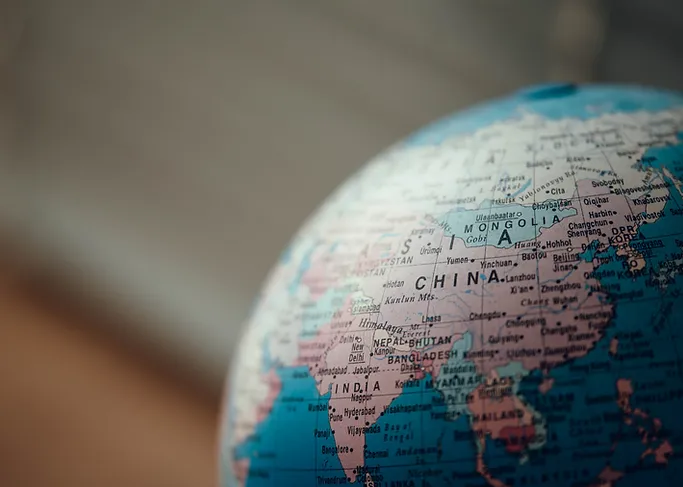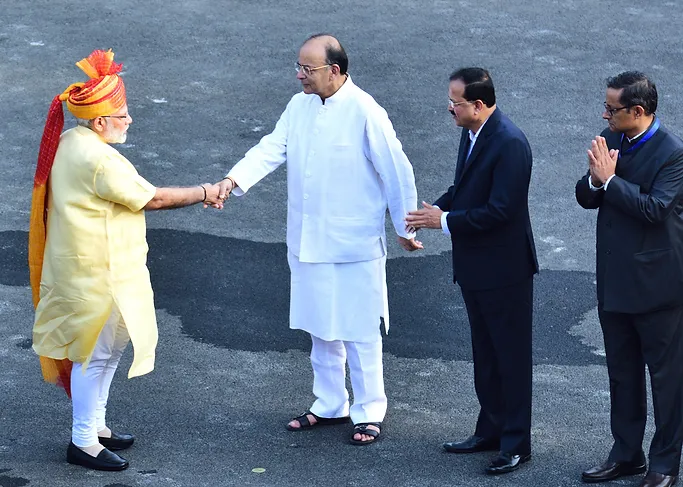We consider the geopolitical macro view that forms the background to our bottom up value investing approach.
While the details of the dispute over whether Kashmir should have been a part of Pakistan when the British left in 1947 is a bit too complicated to go into, the recent spate of terrorist attacks and the willingness of India to go public with its surgical attacks (Note: the USA has carried out over 500 drone attacks in the Middle East during Obama's 8 years in power at an average of 1 per week. Though this is 10x that under President Bush, but the US does not make too much noise about this!) suggests that events along the Indo-Pak border are in, many ways, taking us into uncharted territory. This is largely due to the confluence of three factors:
- Geopolitics,
- The emergence of a new global enemy, and
- Domestic opportunism in India
Warm up that coffee as I try to navigate the complex world we live in and take a break from the relatively simple world of value investing! Here goes….and please don't grade me for a geopolitical exam or my preparedness for a Presidential debate!
Geopolitics was never about Right and Wrong
There has been a seismic shift in geopolitics of the Indian Subcontinent, largely ignored and unreported. India and Pakistan have fought three wars over Kashmir: 1948, 1965, and 1999. There was a fourth war in 1971 for the liberation of East Pakistan for what is today Bangladesh.
In the 1971 war, the US (led by President Nixon and National Security Advisor Henry Kissinger) backed Pakistan and supported the China view that India needed to be contained. The Seventh Fleet was sent into Indian waters and USA covertly shipped spare parts and arms to Pakistan. The fact that Russia had signed a pact with India in August 1971 to defend any other regional aggressors (China, USA, and UK) saved India from being surrounded by a ring of enemy fire.
Pakistan sits on India's head: a permanent headache!
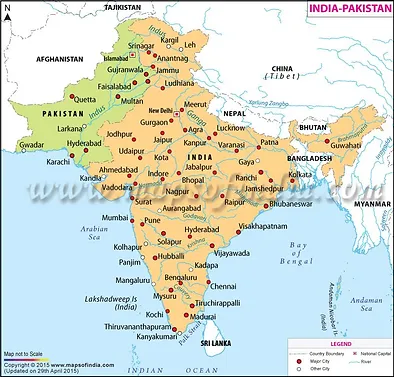
This is an extract from Volume XI of the Foreign Relations of the United States:
In a telegram sent to US Secretary of State Will Roger, on March 28, 1971, the staff of the US consulate in Dhaka complained, 'Our government has failed to denounce the suppression of democracy. Our government has failed to denounce atrocities. Our government has failed to take forceful measures to protect its citizens while at the same time bending over backwards to placate the West Pakistan dominated government… We, as professional public servants express our dissent with current policy and fervently hope that our true and lasting interests here can be defined and our policies redirected in order to salvage our nation's position as a moral leader of the free world.'
But the US did not heed the communication from its Embassy in Dhaka (known as the Blood Telegram, after Archer Blood, the then Ambassador stationed in Dhaka) and, instead, chose to go with China's analysis of the situation! Archer's stay in Dhaka was cut short as a punishment for being honest. He died unknown in USA but was a hero in Bangladesh.
During the second week of July, 1971, Kissinger arrived in Beijing, where he heard the words by then Chinese Prime Minister Zhou Enlai: “In our opinion, if India continues on its present course in disregard of world opinion, it will continue to go on recklessly. We, however, support the stand of Pakistan. This is known to the world. If they [the Indians] are bent on provoking such a situation, then we cannot sit idly by.' On this, Kissinger responded that China should know that the US also backs Pakistan on this issue.
Despite the pressures from the US and its new-found love for China, India won and Pakistan lost and Bangladesh was born. Since 1971 India tilted towards Russia and very quickly the USSR became the largest military and economic partner for India.
But what governments can mess up, people can undo. Even prior to the collapse of the Berlin wall in 1989, the growing connectivity between millions of Indians studying and working in the US and UK and their frequent visits to their families back in India, saw a dramatic desire within India to increasingly look towards the West for inspiration. From movies to music to computers to consumer products, western brands started to gain more recognition in India as travelers from the US brought two oversized bags of 32 kg each filled with American goodies back home to India.
That 64 kg worth of checked baggage probably caused the bankruptcy of PanAm and TWA and changed aviation history - but did not make a dent on US policy! The US continued to need Pakistan due to its critical geographical location: (i) to fight the Russians in Afghanistan from 1979 till 1989 (think Bin Laden as a loyal soldier of the Pakistan-controlled Taliban perched on the mountain ranges of Pakistan waiting to attack Russian soldiers in Afghanistan) and, (ii) to ensure that the US had a firm base close to the Middle East to oversee Iran, which had gone rogue with the induction of Ayatollah Khomeini as the Supreme Leader.
It mattered little to the US that guns shipped to Pakistan to fight on its western border with Afghanistan were trained towards India and Kashmir: probably referred to as “collateral damage” in some military file. In December 1989, after decades of a dispute which was largely confined to border areas, Kashmir sunk into a full-fledged separatist movement. It is noteworthy that Russia withdrew from Afghanistan in 1989. The arms used to trouble the Russians were still sloshing around in Pakistan and could now be solely focused on Kashmir. The Taliban, a creation of the Pakistan intelligence agency, ISI, was now free to cause trouble in Kashmir and stunt India.
From a US perspective, not much seems to have changed on the importance of Pakistan as an ally. In June 2016, the Senate set up a fund to give Pakistan USD 800 million for its help in the “war against terror”! Yes, this to a country that had Bin Laden hanging around for a few years in a secure compound till the Seals got to him. But then, to fully understand the foreign policy of the US, one only needs to recall the quote from President Roosevelt with reference to Nicaraguan dictator Somoza:
He may be a son of a ****
but at least he is our son of a ****.
(For those voting for a US President, note that Secretaries of State don't really have a difficult job. The ancestry of world leaders is known, what matters is to assess who they bark for! And Presidents have a fun job that does not need a lot of temperament: the true test is whether they can calmly authorize cash payments of USD 400 million in Euro and CHF shipped in wooden crates to Iran and claim it was debt being repaid! Al Capone must be delighted that, in an age of electronic banking, cash is still king!)
Driven by the business potential in India and concern over the security of East Asia, the US may be doing a pivot in Pakistan/India. Given India's growing economy and China's flexing muscles, the US has been desperate to (i) support the business interests of multinationals in India (President Obama has made two visits to India) and, (ii) give smaller Asian countries an opportunity to look for another Big Brother in Asia and not allow China to be the “geographical reality” that dominates the thinking of the smaller nations in Asia.
The ingenious solution has been the creation of an India-Japan axis: India has demand for products due to its large population and Japan has the capital to help fund the infrastructure investments plus world class companies and products. Asian countries can aspire to be friends with the India-Japan axis and not be bullied into an uneasy relationship with China. (Note the statement of Singapore's Prime Minister on September 30 that Japan “must play a larger role in Asia”. And he is now in India on a state visit.)
The navies of India and USA began the Malabar Exercise on June 7, 2016 very close to the South China Sea - and Japan joined in for the fourth time since the inception of the Malabar Exercise in 1992. A description: The Special Forces of the three navies will also interact during the exercise. Ahead of the exercise, the defense establishments of all three countries highlighted its importance in facilitating interoperability. The U.S. Navy statement stressed that each iteration of the exercise “helps to advance the level of understanding between the navies Sailors, and is a continuing process over time.” The Indian defense ministry said the exercise represented “another significant step” in strengthening mutual confidence, interoperability, and the sharing of best practices between the Indian, Japanese, and U.S. Navies. “The exercise will support maritime security in the Indo-Pacific region, and benefit the global maritime community,” it said. China is not amused.
China shares a border with India and this, too, is in dispute
India and China went to war in October 1962 and India lost. China continues to flex its muscles on India's north-eastern borders and periodically breaches the 2,500 mile shared border. The most recent standoff was in September 2015. Both countries have increased the presence of troops along their borders. China remains a significant supplier of arms to Pakistan. China is also building the USD 40 billion China Pakistan Economic Corridor which will connect south-west China to the port city of Gwadar in Pakistan and give China an eventual train/road supply chain to support a naval base within striking distance of the Persian Gulf. Empires think big.
China pins India down with its rising might
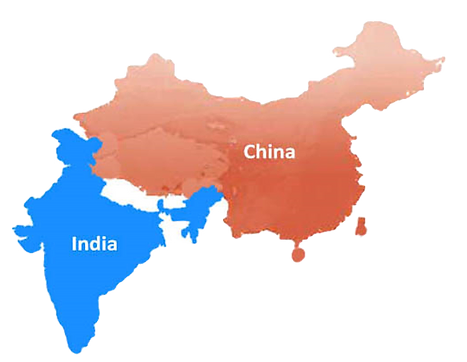
Meanwhile, over the past year, China has not supported India's bid for a permanent seat on the UN Security Council. An attempt to include India into the Nuclear Suppliers Group was vetoed by China in July. On September 30, a resolution by the UN Security Council to list a known leader of a terrorist organization living in Pakistan was rebuffed by China on the grounds that there was no evidence.
Russia, a strong and staunch ally of India, has recently been feeling left out as India cozies up to the US/Japan vision of creating an alternative Asian nexus. It has initiated defense deals with Pakistan after a gap of 60 years! However, Russia still supports India on Kashmir.
UK: well, not only did they exit South Asia and leave it (and themselves!) in a mess, they seem to have done a Britney “oops, I did it again” to Europe with their stunning Brexit! Net, net: neither the UK nor Europe is a material player in South Asia. They will toe the US line and slip in to win a few arms deals when they can.
A new enemy rises
After 9/11, the world has a new enemy: acts of terrorism committed in the name of Islam.
It has taken the US over a decade to start weaning away from the Saudi regime and start establishing ties with other actors in the Middle East, notably Iran. Pakistan remains of huge interest due to its geography - but also because it has nuclear capability and possesses the first “Islamic Bomb”. The US has backed many unsavory folks in the Middle East and remains clueless on figuring out who these sons of ****** are and who they actually work for!
In previous India/Pakistan conflicts, the Middle East regimes - particularly the Saudis and their crude oil power - would step in with some words balancing the fact that they were Islamic nations (and therefore a natural bias towards Pakistan) and the fact that they had to sound diplomatic. Since there now is an emerging Shia Iran and the Shia/Sunni wars are also played out in Pakistan there is no unifying Islamic voice that India is terrified of.
And, much as China needs Pakistan for a cheap proxy to scuttle India's economic and global ambitions, China is equally wary of Islamic influence within its own borders.
Ditto for Russia: despite its new dealings with Pakistan.
China links from the Arabian Sea to the Sea of Japan
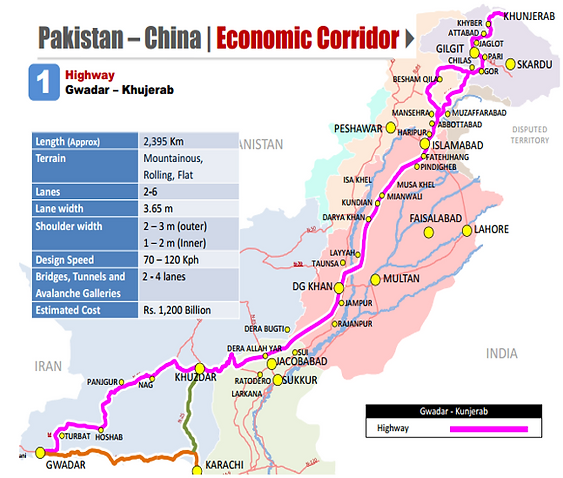
Local politics: natural hatred for all that is Pakistan!
To add to the global backdrop is the Indian masala: a general, natural hatred for all that is Pakistan even amongst a highly educated class of people and the opportunity this offers to stay ahead in local politics. For right or wrong, think of Trump, the Brexit vote, and the decimation of Angela Merkel. Two years and 5 months into its 5 year term, the BJP needs a boost.
After having lost local elections in large states, the attack by “Pakistan-based terrorists” on an army camp near Uri, in northern Kashmir on September 18 (in which 19 soldiers and support staff eventually died and 30 were wounded) gives the BJP a chance to flex its muscles. The “surgical strike” by India also obliterates the memory of the softer side of Prime Minister Modi's 56-inch chest because of his fly-through to Pakistan to meet Prime Minister Sharif on his birthday on December 25, 2015 - which also happened to be the week when Sharif's grand-daughter was getting married. The militant branch of the BJP were not happy with Modi's olive branch and nor were many of his voters.
Meanwhile, the state of Kashmir - the cause of all these problems and the reason of my delving into geopolitics - has been on a high-level alert and a slow boil since July 8 when a terrorist leader was killed and then worshipped as a martyr by a large number of locals in Kashmir. The state has been effectively shut down since July 9. The BJP is not looking good since the state of Kashmir is governed by its ally! Along comes this Uri attack on September 18…and the people want to see the 56-inch chested Modi put on his gladiator suit and rip it to them….
Is war a no-win solution?
Well, what will happen next?
It depends on what China does: they have called for restraint from India and Pakistan. But China may be sending a twisted message to India: stop these naval excursions towards the South China Sea or China can cause more trouble via its proxy state, Pakistan.
It depends on what the US does: Pakistan is a headache that the US has funded - and still funds. It is a mess and there is still that nuclear bomb somewhere…the fear of a dirty bomb hanging around the neck of a jihadist may cause the next President to tweet away from the White House at 5 am and wonder where Miss Piggy is hiding!
It depends on how “strong” Pakistan wants to show itself to be: with all the characteristics of a failed state, the government may want to yell one last battle cry! India's vocal and public announcement of its surgical strike means that an escalation cannot be ruled out.
And it depends on what the BJP and Modi do: there is a big state election in Uttar Pradesh, the largest state in India, in May 2017. A win there is crucial for the BJP. A lesson taught to Pakistan will go a long way in trying to win that election - though 7 months is an eternity in politics and this recent border “episode” may be forgotten by then!
Personally, I don't rule out an escalation for a few days - perhaps sporadic shootings - though war-drums in some sections of the Indian media are already at fever pitch!
The INR will be under pressure as nervous foreigners sell.
The RBI in any case has to repay about USD 20 billion in loans taken in 2013: it has already built up the USD reserves for that. But sentiments many times overtake facts. However, the October 4th meeting of the RBI and the 25 bps cut in interest rates may be a sign of self-confidence and positioning.
Locals may go short on the Indian stock markets, but there could be quick rebound: multiple WhatsApp chat groups saying buy on the dip, plus a general feeling that selling equities now will be unpatriotic and play into the hands of Pakistan by making India look weak, may limit the pressure on the markets. To further warn the “don't you dare think about shorting” camp, the government announced that the Employees Provident Fund will double its exposure to equity from 5% allocation to a 10% allocation, a boost of about USD 2 billion in inflows for the next 6 months. The labor unions grumbled this decision was made without their consent. With interest rates sub-zero in many parts of the world, time is on the buyer's side. The Fed's decision to keep interest rates on hold has added to global liquidity. The First Presidential Debate in the US has given comfort to many that Clinton will win and it will be “business as usual”.
As value managers, we like to focus on what the companies do: on their businesses, on the managements and their integrity. We have taken a detour into the minds of people who play RISK and roll the dice with our lives.
India - as with any country - will be hurt by a prolonged border issue. But, investors must note that this is a problem that will never go away. The geography of the world has been very unkind to India: we have to deal with troublesome Pakistan on the west and a frighteningly resurgent China on the east/north. Just as a Japan or a South Korea have their own geographical issues.
But we do have some world class managements running world class businesses! So, if the markets fall a lot out of fear, we will quickly evaluate what happens to the businesses of these companies before we actually place orders to buy more - and potentially ask you to allocate more capital to India.











